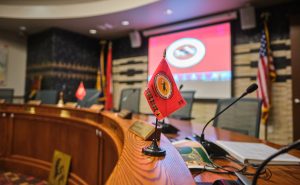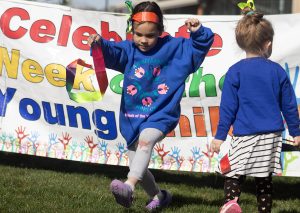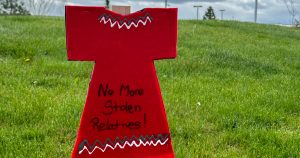By Wil Phinney of the CUJ
MISSION – “Black Lives Matter” to members of the Board of Trustees (BOT) for the Confederated Tribes of the Umatilla Indian Reservation (CTUIR).
And even though the nine policy makers couldn’t agree in June on an official statement calling for justice after a white police officer killed George Floyd in Minnesota May 25, the BOT did conclude that it is time to join the rest of America and examine police policies and procedures.
One of the outcomes of the Tribal Police Department review will likely be the addition of body cameras for patrolmen.
Board member Jill-Marie Gavin suggested May 31, six days after a Minnesota cop knelt on Floyd’s neck for more than eight minutes, that the BOT issue a statement in support of Black Lives Matter (BLM). Black Lives Matter is a global movement advocating non-violent civil disobedience to protest police brutality against black people.
Most BOT members responded favorably to the idea.
“We wanted to offer our condolences to the family and our continued support for justice reform as we’ve done in the past with VAWA (Violence Against Women Act), MMIW (Missing and Murdered Indigenous Women) and ICWA (Indian Children Welfare Act),” Gavin said.
However, BOT Chair Kat Brigham and BOT member Armand Minthorn had concerns about how the message was to be presented.
Brigham pushed for an “People of Color lives matter” message to be “proactive than reactive.”
“We wanted to be careful about how we presented our support, our position to the outside world,” Brigham said. “We’re not afraid of the outside world, but we wanted a strategy on how it would be done.”
BOT Vice-Chair Jeremy Wolf spoke for the majority when he said, “Black Lives Matter is a very specific outcry and we’re in support of that. It is specific to those people who are of that race who are being singled out and have been for a long time. We can issue our support knowing we’ve been through that. Black Lives Matter is a specific outcry.”
However, Gavin said, even though seven of the nine wanted the statement, the full board agreed that anything but a unanimous decision would be disingenuous.
Rather, the Board turned their attention inward.
“We decided to look at ourselves first, at our own police policies and procedures,” said Brigham, who presided over a June 18 work session with Tribal Police Chief Tim Addleman.
At that meeting, Brigham asked about Tribal police methods.
“Do they need to be changed? If we need to, we change it,” she said. “We support Black Lives Matter, but there’s a history of tribal evidence, too. I could tell you horror stories about Pendleton.”
Gavin said she didn’t have an argument about supporting people of color, but she looks at it from a different view.
“From my perspective, I feel that although Indigenous people do suffer more police abuse per capita it is still important to support Black people and the African American community and acknowledge the large number of Tribal members in Indian Country who are also Black. It doesn’t make you any less indigenous or any less Black.”
Gavin has four children with Black fathers but she doesn’t want people to think that’s why she’s so concerned.
“People assume I want to support this because I have Black children,” Gavin said. “Realistically it’s everyone’s responsibility. If you have family you should be concerned whether they’re Black or not. Laws don’t change just for Black people. When we help someone else, it helps us as well.”
It is heartening to know that tribes support each other, Gavin said, pointing to the way Indian Country has rallied around the COVID-19-wracked Navajo Reservation.
“It’s not us or them. When we do that it’s an erasure of Indigenous people who are also Black and those people make a huge contribution to Indian Country. They are tribal members and they are Natitayt,” Gavin said. “I feel like we should be taking care of each other. That’s what ‘one heart, one mind’ is all about.”
The body cameras, BOT members said at the work session, are a good place to start.
Chief Addleman outlined two options – one using an “easy” cloud-based system or another using a “manpower-intensive” upload system that would likely require an on-site server.
Board members were interested in how the body cameras could be used to hold accountable both police officers and the people with whom they come into contact.
“There is a huge disconnect between the community and our police department,” said BOT member Corinne Sams, suggesting that the body cams could benefit the police by protecting them from false allegations while also improving accountability.
Addleman told the Board that studies show that body cameras are valuable as a documentation resources, but aren’t much of a deterrent in arresting insolent behavior.
“Some people really don’t care if they’re being recorded,” Addleman said.
Sams also talked, at that June 18 work session, about police misconduct and asked Addleman to provide a record of citizen complaints over the last several years. Addleman has produced a list of 66 formal complaints made over the last nine-and-a-half years dating back to 2010. Only two of those were complaints for use of force.
Gavin said determining whether or not there is a problem with Tribal Police depends on who you ask.
“It’s an overall culture that lives within American policing,” she said. “If you ask one Tribal member they’ll say, ‘No, the Tribal Police are great.’ You ask another and they’ll say, ‘No, they slammed me on the ground for no reason.’ I think it needs a system reset so we can look really hard at our own department.”
Gavin said she thinks it is important that Tribal police are representative of the Tribal population.
“They should know us and understand us. They should be people that are part of the community and not from outside counties who want to come in and crack down unnecessarily. We’ve had complaints about unnecessary use of force and we’ve had police officers fired. It’s not just our own police force, but America’s police in general,” Gavin said.
Brigham said she anticipates many changes coming to police policies and procedures throughout the United States.
On the Umatilla Indian Reservation, she expects Tribal Police will get body cameras to go with the cameras already installed in patrol cars. However, she and other BOT members were surprised when Addleman told them that digital cameras that have been in patrol cars for several years are virtually useless because police don’t have the ability to download information.
In 2016, Addleman said, Tribal Police were assisting on an Oregon State Police pursuit when the suspect started shooting.
“Our cameras would have caught the episode,” including the firearm engagement and when the suspect rammed his vehicle into the OSP car, “but we weren’t able to provide evidence because we couldn’t download it.”
Brigham noted the current state and federal legislation taking place on police reform and noted that the U.S. Attorney in Oregon is part of an outreach program to the state, including Tribes, identifying changes that are being considered.
Brigham also noted that the Columbia River Inter-Tribal Fish Enforcement is considering new training protocols.
“We’re definitely going to see some changes,” Brigham said. “There is going to be more accountability. When somebody uses force other officers aren’t going to sit back and watch anymore.”
Brigham said it is important to understand that law enforcement is necessary to protect society and she doesn’t want anyone to think she is against rules and regulations.
“I stated in my column (see Page 6) that we fought hard to get our own enforcement as part of our sovereignty because if you pass rules and regulations you’ve got to be able to enforce them,” Brigham said.
Now the cities, the counties, the states, the federal government – even the world – know about George Floyd and Black Lives Matter, Brigham said.
That can only help the cause of Native Americans as well.
“This was all prompted by George Floyd. His death got everybody’s attention,” Brigham said. “I know Tribal people have had people die because of abuse by police. Tribal members have died in jail, but we could never get anybody’s attention. George Floyd definitely made headlines and people are saying that’s not right and they’re beginning to make their voices heard, they’re beginning to make it known that we do want change.”



